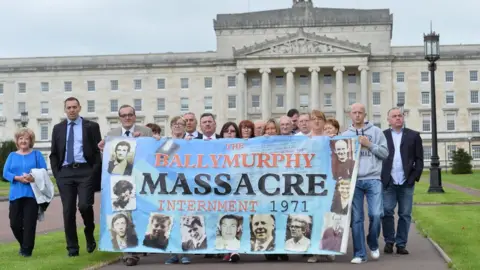Ballymurphy: Legacy issues remain despite inquest decision
 Pacemaker
PacemakerToday is another of those days in which the past makes itself felt in the present.
It is a day which serves as a reminder that while the Troubles officially ended 23 years ago, historical events are still being fought out in courtrooms.
The Ballymurphy families battled long and hard for this moment.
The new inquest was granted back in 2011, ordered by the attorney general, who was presented with a fresh dossier of evidence.
Other cases wait in the wings to start or finish.
There have yet to be findings made in the inquest into the murders of 10 Protestant men by the IRA at Kingsmills in 1976.
Scores of others legacy inquests will run over the next five years, many dealing with state actions from the 1970s and 1980s.
In most cases, families are seeking to get at the truth or a form of closure denied to them by a police investigation and a criminal justice process.
Add to that, almost 1,000 unresolved Troubles cases still in the hands of the Police Service of Northern Ireland.
Two thirds of them relate to deaths caused by republican and loyalist paramilitaries.
Add to that, the 250-or-so killings being independently being re-investigated by Jon Boutcher and his Operation Kenova team.
There are also calls for public inquiries into the Omagh, Enniskillen and La Mon bombings, and the murder of solicitor Patrick Finucane.
 PAcemaker
PAcemakerCo-incidentally, the Ballymurphy inquest finishes on a day when the government commits to legislation on dealing with the past.
Controversially, at its heart, is an effective amnesty, ending prosecutions and instead going for an information recovery process.
Decades after the conflict ended, the government wants to draw a line in the sand.
But will it be one on which there is enough agreement?
Will it contain an investigation process, will answers for families replace court battles, and will it ultimately help heal the past?
